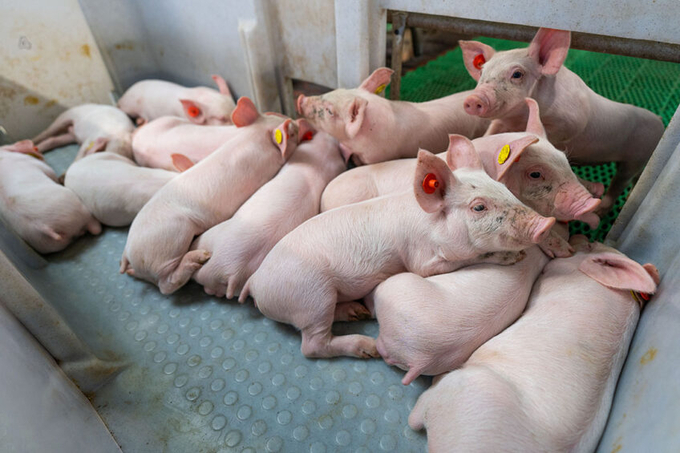November 28, 2025 | 03:36 GMT +7
November 28, 2025 | 03:36 GMT +7
Hotline: 0913.378.918
November 28, 2025 | 03:36 GMT +7
Hotline: 0913.378.918

Post-weaning diarrhea occurs within 2 weeks after weaning. Its symptoms are diarrhea, dehydration, significant mortality, and loss of body weight of surviving piglets. Photo: Jan Willem Schoutes
Options are supplementation of essential oils and probiotics, decreasing acid-binding capacity of feed, and detoxifying deoxynivalenol.
Post-weaning diarrhoea occurs within 2 weeks after weaning. Its symptoms are diarrhea, dehydration, significant mortality, and loss of body weight of surviving piglets. Post-weaning diarrhoea causes financial losses due to reduced growth performance, high mortality and morbidity rates, and compromised piglet welfare.
What causes post-weaning diarrhoea?
Post-weaning diarrhoea is usually caused by the proliferation of Escherichia coli. Thus, antibiotics are used in nursery diets to control diarrhea during the transition. The prophylactic use of antibiotics however results in antimicrobial resistance. This is an environmental, health, and safety concern challenging pork industry sustainability.
Essential oils
Essential oils have antioxidative, anti-inflammatory, and antimicrobial properties. Thymol, eugenol, and cinnamaldehyde are used as antibiotic replacement in swine industry. In addition, thymol, eugenol, and citral reduce inflammation in piglet gut epithelial cells. Cinnamaldehyde improves the gut’s mucosal barrier function. Lauric acid acts as a carrier for thymol and has synergistic antibacterial effects with thymol. Essential oils alter the structure and function of bacterial cell membranes, cause membrane swelling, increase membrane permeability, and enhance bacteria susceptibility to organic acids. Furthermore, the combination of microencapsulated essential oil and organic acid controls post-weaning diarrhoea in piglets.
Probiotics
The positive impacts of direct-fed probiotics in the piglet diet include improved gut health, modified gut microbiota, increased immunity, enhanced efficiency of nutrient digestion and utilisation, improved gut function, and increased growth performance. Direct-fed probiotics comprise of bacillus, lactic acid-producing bacteria, and yeast. Bacillus produces fibre-degrading enzymes, enhances nutrient digestibility and utilisation, and creates short-chain fatty acids through fermentation. Supplementing lactic acid-producing bacteria reduces weaning stress and diarrhea and enhances immunity and growth performance. Yeast supplementation increases gut development and reduces post-weaning scour by supplying specific sugars and nucleotides.
Decreasing acid-binding capacity of feed
Post-weaning piglets have a higher gastric pH because of decreased capacity of gastric acid secretion at weaning. This makes them more vulnerable to gut infections. Low gastric pH is essential for gut health, nutrition digestion, and pathogenic bacteria inhibition. Raw materials in the ration significantly impact gastric pH and nutrient digestibility. The acid-binding capacity value of feed is defined as the amount of acid in milliequivalents needed to reduce the pH of 1 kg of feedstuff to pH 4. High acid-binding capacity decreases dry matter and crude protein digestibility. It also reduces growth performance and releases toxic amine and ammonia. This causes diarrhea. Minerals such as limestone (calcium carbonate), dicalcium phosphate, and mono-dicalcium phosphate increase acid-binding capacity.
Decrease calcium level of feed to relieve post-weaning diarrhoea
Therefore, it is important to decrease calcium level of the feed to relieve diarrhoea. Dietary supplementation of zinc oxide reduces post-weaning diarrhea; however, it has high acid-binding capacity, cause post-weaning anaemia, toxicity, and antibiotic resistance. Thus, it is necessary to replace higher doses of zinc in the feeds, as well. Inclusion of organic acids such as citric acid and fumaric acid decrease the acid-binding capacity of feed and lowers gastric pH. Moreover, it is recommended to replace fishmeal and soybean meal with potato protein, wheat gluten, and corn gluten due to lower acid-binding capacity.
Detoxifying deoxynivalenol
Deoxynivalenol is a mycotoxin commonly occurring on Fusarium-infected cereal grains such as corn, wheat, and barley. Mycotoxin contamination reduces feed intake, compromises the immune system, decreases digestive function and nutrient absorption, and lowers growth performance. Furthermore, deoxynivalenol damages gut epithelial cells, alters gut development and barrier function, and increases susceptibility to enteric pathogen challenge.
Therefore, preventing mycotoxin contamination in swine diet decreases post-weaning diarrhoea. Sodium metabisulfite is effective in deoxynivalenol detoxification. Although, it is required to deliver the intact sodium metabisulfite to the lower gut by encapsulation with hydrogenated palm oil to effectively detoxify deoxynivalenol. In addition, using micro-organisms to convert the toxins to non- or less toxic compounds is an alternative method with high specificity and efficacy.
Concluding remarks
Post-weaning diarrhoea is a significant concern in post-weaning piglets causing reduced growth performance, high mortality and morbidity rates, and compromised welfare. Therefore, it is required to take integrated approaches such as supplementing essential oils and probiotics, decreasing acid-binding capacity of feed, and detoxifying deoxynivalenol to control post-weaning diarrhoea. In addition, further research is needed to find the clear-cut recommendation on the acid-binding capacity values for nursery diet to make the final decision based on science and field experience.
(PigProgress)

(VAN) A new study reveals how the simultaneous effects of ocean acidification, salinity and loss of oxygen are making the world more fragile.

(VAN) Hopes are growing that the creation of the first 3D turkey gut model could be a turning point in the battle against the virulent blackhead disease.

(VAN) Tyson, America’s biggest meat supplier, plans to shutter one of its largest beef processing plants as the industry continues to struggle with low cattle supplies and political pressure from Washington.

(VAN) New FAO study shows how digital solutions are empowering farmers and fishers to prevent losses and build resilient agrifood systems.

(VAN) Brazil's COP30 presidency pushed through a compromise climate deal on Saturday that would boost finance for poor nations coping with global warming but that omitted any mention of the fossil fuels driving it.

(VAN) Poultry farmers in the UK have been warned that they could face one of the worst winters yet for bird flu.

(VAN) Prices of main-crop paddy have risen sharply, with jasmine rice hitting 16,100 baht per tonne — the highest level in years.